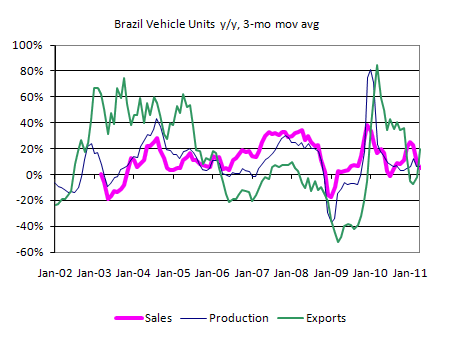Brazil Resorts To Protectionism
By Win Thin
Brazil is reportedly imposing trade barriers on auto parts imports and a variety of other products. Imports of 27 products will reportedly have tighter licensing requirements that can take up to 60 days to approve. These are called non-tariff barriers to trade (NTBs) in trade theory. This development is noteworthy, as protectionist policies were not seen during the depths of the financial crisis. We need to see more details, but a rise in protectionism is never good. It would appear that a strong real is feeding into cheaper imports which are putting domestic Brazilian firms under pressure. Brazil last year overtook Germany as the fourth-biggest car market in the world. In 2010, a total of 3.5 mln vehicles were sold in Brazil, up 12% from 2009 and nearly 140% from 2002. This puts Brazil behind China, the US, and Japan in sales of cars and light trucks, and just ahead of Germany. Another Brazilian paper is reporting that restrictions may be put on auto imports as well, but no further details have been seen in this regard.
Let’s take a look at the Brazil auto parts industry. According to Sindipecas, the Brazilian Association of Autoparts Manufacturers that includes over 500 companies, the Brazil auto parts sector had about $32 bln in total sales in 2009, with exports of around $6.6 bln. The main countries that Brazil exports auto parts to Argentina (29% of total), the US (17.5%), Germany (9%), and Mexico (8%). More relevant to today’s news, the main countries that Brazil imports auto parts from are Germany (20% of total), Japan (14.5%), the US (12%), Argentina (10%), France (7%), Italy (7%), and China (5%). It’s interesting that the three biggest euro zone economies account for over a third of Brazil’s auto parts imports, and so likely to be affected the most by these Brazilian moves.
We note that despite worries that countries around the world would worsen the global downturn with rising protectionism (think Smoot-Hawley during the Great Depression), not many barriers were erected during the financial crisis. Brazil appears to be a bit of a special case in that it’s clear that policy-makers are reacting to complaints from domestic auto parts manufacturers who are getting squeezed by the strong real. Exports have gotten more expensive while domestic sales are getting squeezed by cheaper imports. The big question to us is whether these NTBs will be allowed under WTO rules. We would expect Brazil’s trading partners to take this to the WTO in the form of a complaint. On the other hand, it was just reported that Brazil won the approval of a WTO working group to discuss the impact of exchange rates on trade and competitiveness. Finance Minister Mantega said that the WTO may recognize currency manipulation as potentially being an unfair subsidy. This may be wishful thinking on his part, but it is certainly an issue that bears watching.




Comments are closed.